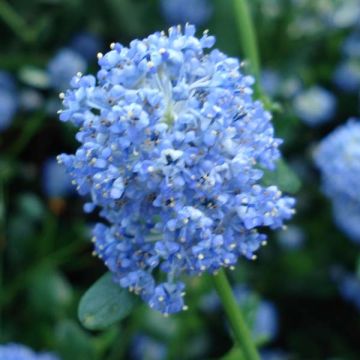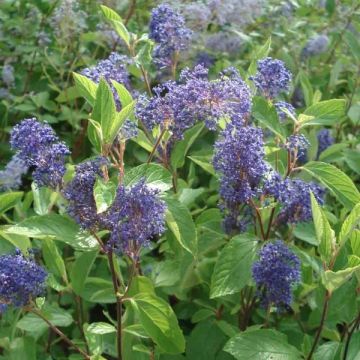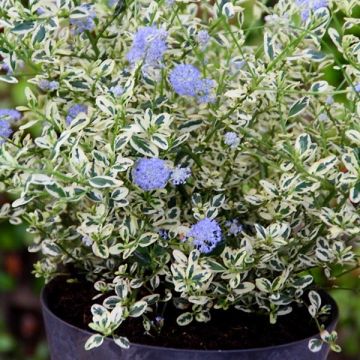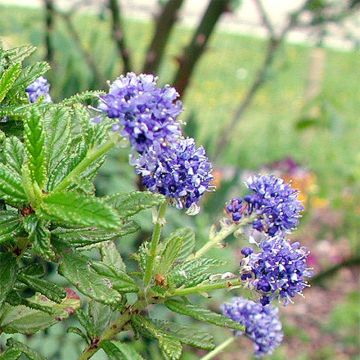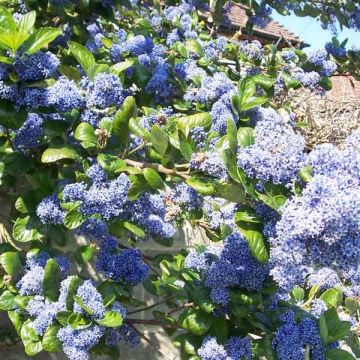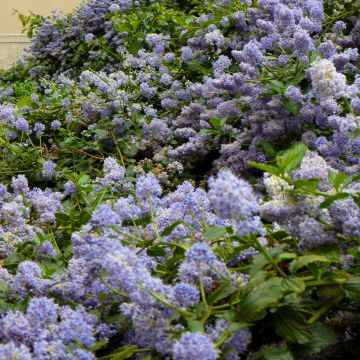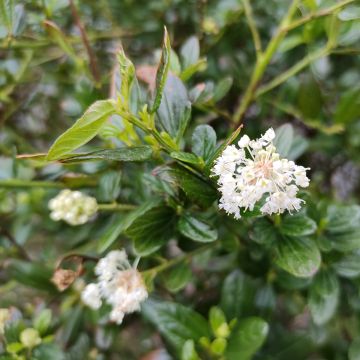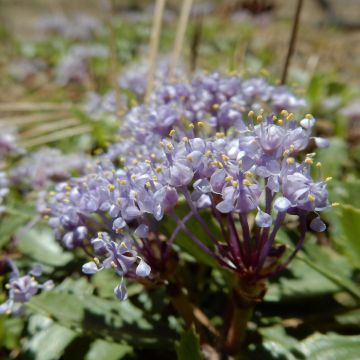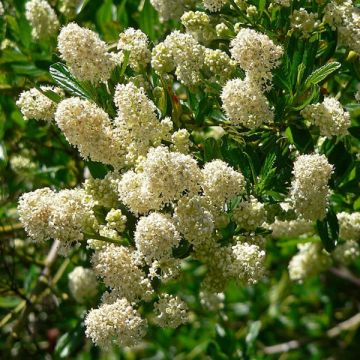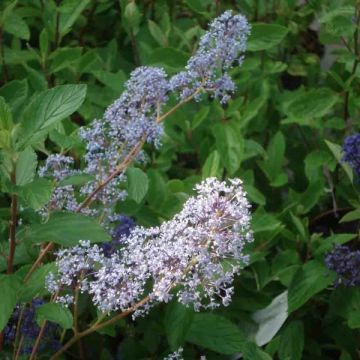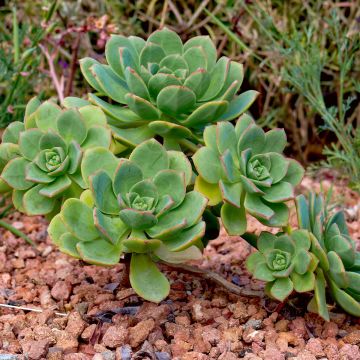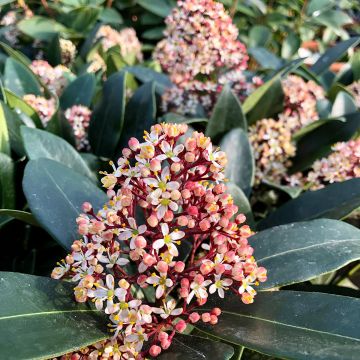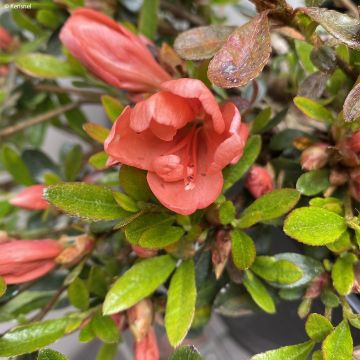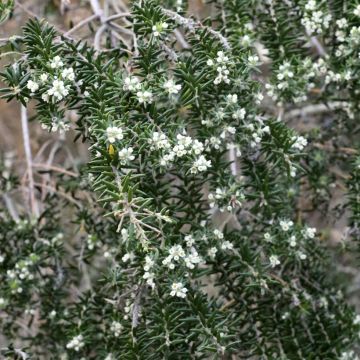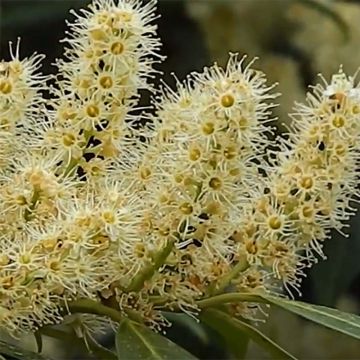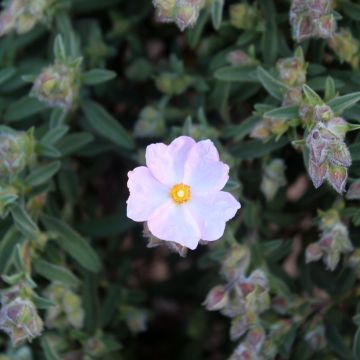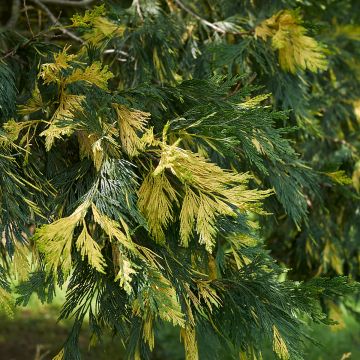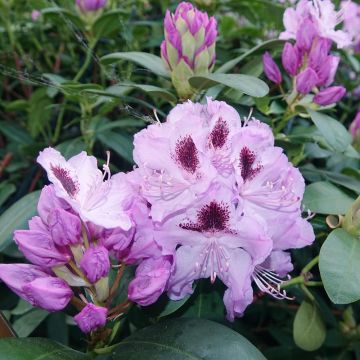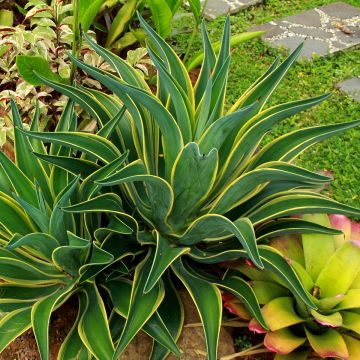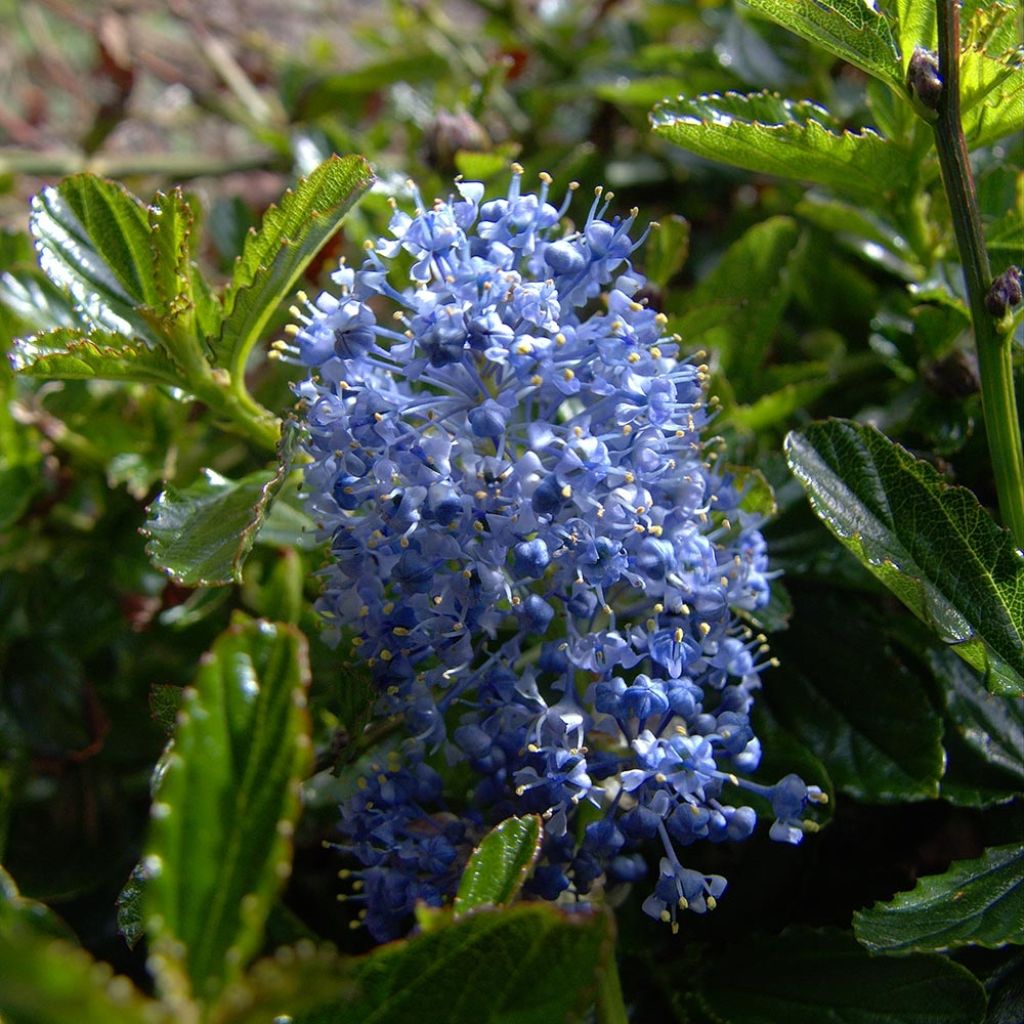

Ceanothus Burkwoodii
Ceanothus Burkwoodii
Ceanothus Burkwoodii
California Lilac
This item cannot be shipped to the selected country
Delivery charge from €5.90
More information
Schedule delivery date,
and select date in basket
This plant carries a 24 months recovery warranty
More information
We guarantee the quality of our plants for a full growing cycle, and will replace at our expense any plant that fails to recover under normal climatic and planting conditions.
From €5.90 for pickup delivery and €6.90 for home delivery
Express home delivery from €8.90.
Does this plant fit my garden?
Set up your Plantfit profile →
Description
ceanothus 'Burkwoodii', also known as Californian lilac, stands out for its long summer flowering which is rare for ceanothus, in abundant panicles of bright light blue, tinged with mauve. This evergreen bush grows rapidly into a compact, medium-sized bush, making it interesting for mass planting, informal hedges and solitary planting. Ceanothus plants thrive in warm and sunny locations, in dry, well-drained soil without limestone. It is best suited for gardens in mild climates or elsewhere in sheltered locations, trained against a south-facing wall.
Ceanothus plants belong to the rhamnaceae family, they are cousins of our buckthorn (Neprun purgatif), and grow in dry, well-drained environments such as scrub vegetation relying on rainwater once well-rooted. A constantly wet soil and daily or too frequent watering once the plant is established will generally lead to its demise. Like most evergreen hybrids, it is not very hardy, tolerating minimum temperatures of -7°C (19.4°F).
The ceanothus 'Burkwoodii' has a medium growth rate and a compact bushy habit. When mature, it reaches a height of 1m (3.3ft) with a spread of 2m (6.5ft). It is a relatively short-lived bush, living no longer than about ten years. Its flowers appear from July and regularly bloom until September, in the form of panicles measuring 5 to 6cm (2 to 2.4in) at the ends of the branches. This abundant flowering attracts many pollinating insects. It is followed by the formation of seeds which are explosively released. The evergreen foliage contrasts beautifully with the bright flowers. The foliage consists of small, alternate, ovate, leaves that are 3 to 4cm (1.2 to 1.6in) long and dark green. Ceanothus plants tolerate light pruning of faded flowers and obstructive branches.
Because the love for blue blooms is ongoing, horticulturists have 'invented' beautiful ceanothus varieties in recent years, which are easier to acclimate and of more modest dimensions, suitable for our gardens and terraces. The 'Burkwoodii' ceanothus is a beautiful subject to plant in a mass of easy-to-grow shrubs in mild climates: the Buddleia officinalis (pale pink, starting in February), the Fremontodendron californicum (in April-May-June), the coronillas (in April), shrubby rockroses (Cistus laurifolius, in May), as well as junipers and strawberry trees. The golden foliage of the Choisya ternata 'Goldfinger' and the yellow blooms of hypericums will contrast beautifully with its intense blue flowers. In a wild-style garden, consider combining it with the more free-growing habits of Spanish brooms, silver elaeagnus, rosemary, cortaderias, and the spiky silhouettes of yuccas.
Report an error about the product description
Ceanothus Burkwoodii in pictures
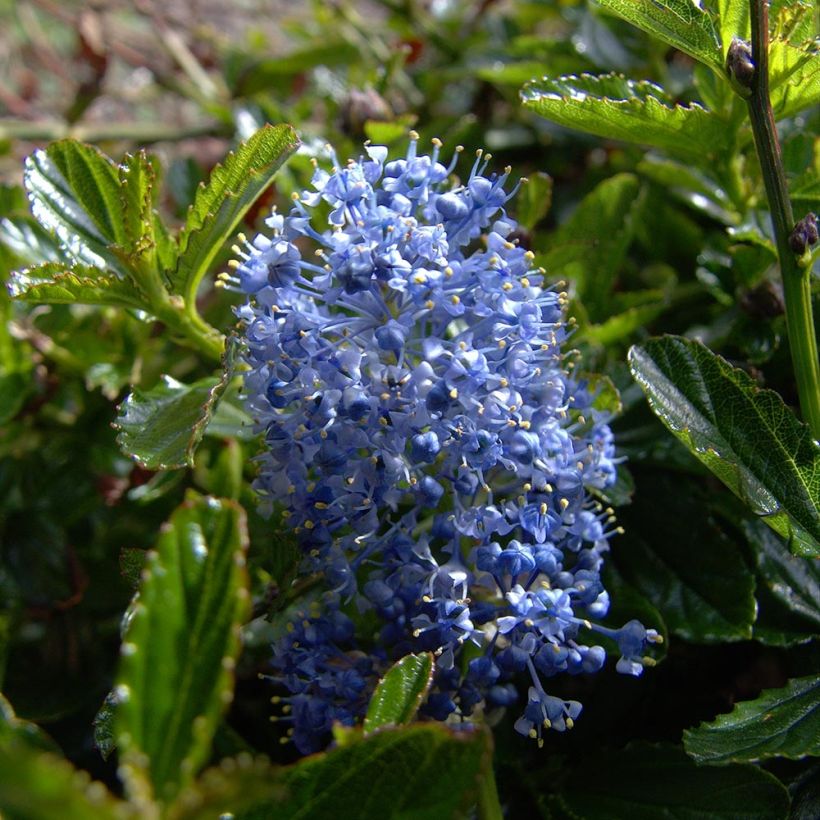

Plant habit
Flowering
Foliage
Botanical data
Ceanothus
Burkwoodii
Rhamnaceae
California Lilac
Cultivar or hybrid
Other Ceanothus
Planting and care
Place Ceanothus in a sunny or partially shaded (in the south or in a hot region) position. Plant them in ordinary soil that must be moist in summer, but very well-drained. The 'Burkwoodii' Ceanothus can withstand brief frosts of around -7°C (19.4°F) once mature and it tolerates heavy soils very well if they are dry in summer. Be careful of cold drafts which it does not like, it can be placed near a wall.
Plant it all year round if frost-free, mixing your garden soil with compost, coarse sand, gravel, perlite, or any material that does not retain moisture. Water generously once or twice a week to promote establishment. In hot and dry climates, planting in early autumn is preferable. Only water twice a month from the third year onwards, and only in case of summer drought. It is a plant that requires very little maintenance and grows easily as long as the conditions are met. Moisture in the soil during the winter period, as well as in summer, is harmful to the plant. The combination of heat and humidity leads to the development of a fungus that attacks the collar of the bush and will be fatal to it. In affected soils, it is better to plant Ceanothus on a mound. You can lightly prune the stems after flowering to encourage the plant to branch out. Fertilizer application is not recommended (just add a little bonemeal at the bottom of the planting hole).
Cultivation in pots:
Use a lightweight substrate, a mixture of garden soil, coarse sand, and compost. In summer, water abundantly but only when the soil is dry, spacing out the waterings. The plant can be stored in a cool, unheated, and bright place, protected from severe frosts over winter. Apply a slow-release fertilizer in spring and autumn.
Planting period
Intended location
Care
This item has not been reviewed yet - be the first to leave a review about it.
Evergreen shrubs
Haven't found what you were looking for?
Hardiness is the lowest winter temperature a plant can endure without suffering serious damage or even dying. However, hardiness is affected by location (a sheltered area, such as a patio), protection (winter cover) and soil type (hardiness is improved by well-drained soil).

Photo Sharing Terms & Conditions
In order to encourage gardeners to interact and share their experiences, Promesse de fleurs offers various media enabling content to be uploaded onto its Site - in particular via the ‘Photo sharing’ module.
The User agrees to refrain from:
- Posting any content that is illegal, prejudicial, insulting, racist, inciteful to hatred, revisionist, contrary to public decency, that infringes on privacy or on the privacy rights of third parties, in particular the publicity rights of persons and goods, intellectual property rights, or the right to privacy.
- Submitting content on behalf of a third party;
- Impersonate the identity of a third party and/or publish any personal information about a third party;
In general, the User undertakes to refrain from any unethical behaviour.
All Content (in particular text, comments, files, images, photos, videos, creative works, etc.), which may be subject to property or intellectual property rights, image or other private rights, shall remain the property of the User, subject to the limited rights granted by the terms of the licence granted by Promesse de fleurs as stated below. Users are at liberty to publish or not to publish such Content on the Site, notably via the ‘Photo Sharing’ facility, and accept that this Content shall be made public and freely accessible, notably on the Internet.
Users further acknowledge, undertake to have ,and guarantee that they hold all necessary rights and permissions to publish such material on the Site, in particular with regard to the legislation in force pertaining to any privacy, property, intellectual property, image, or contractual rights, or rights of any other nature. By publishing such Content on the Site, Users acknowledge accepting full liability as publishers of the Content within the meaning of the law, and grant Promesse de fleurs, free of charge, an inclusive, worldwide licence for the said Content for the entire duration of its publication, including all reproduction, representation, up/downloading, displaying, performing, transmission, and storage rights.
Users also grant permission for their name to be linked to the Content and accept that this link may not always be made available.
By engaging in posting material, Users consent to their Content becoming automatically accessible on the Internet, in particular on other sites and/or blogs and/or web pages of the Promesse de fleurs site, including in particular social pages and the Promesse de fleurs catalogue.
Users may secure the removal of entrusted content free of charge by issuing a simple request via our contact form.
The flowering period indicated on our website applies to countries and regions located in USDA zone 8 (France, the United Kingdom, Ireland, the Netherlands, etc.)
It will vary according to where you live:
- In zones 9 to 10 (Italy, Spain, Greece, etc.), flowering will occur about 2 to 4 weeks earlier.
- In zones 6 to 7 (Germany, Poland, Slovenia, and lower mountainous regions), flowering will be delayed by 2 to 3 weeks.
- In zone 5 (Central Europe, Scandinavia), blooming will be delayed by 3 to 5 weeks.
In temperate climates, pruning of spring-flowering shrubs (forsythia, spireas, etc.) should be done just after flowering.
Pruning of summer-flowering shrubs (Indian Lilac, Perovskia, etc.) can be done in winter or spring.
In cold regions as well as with frost-sensitive plants, avoid pruning too early when severe frosts may still occur.
The planting period indicated on our website applies to countries and regions located in USDA zone 8 (France, United Kingdom, Ireland, Netherlands).
It will vary according to where you live:
- In Mediterranean zones (Marseille, Madrid, Milan, etc.), autumn and winter are the best planting periods.
- In continental zones (Strasbourg, Munich, Vienna, etc.), delay planting by 2 to 3 weeks in spring and bring it forward by 2 to 4 weeks in autumn.
- In mountainous regions (the Alps, Pyrenees, Carpathians, etc.), it is best to plant in late spring (May-June) or late summer (August-September).
The harvesting period indicated on our website applies to countries and regions in USDA zone 8 (France, England, Ireland, the Netherlands).
In colder areas (Scandinavia, Poland, Austria...) fruit and vegetable harvests are likely to be delayed by 3-4 weeks.
In warmer areas (Italy, Spain, Greece, etc.), harvesting will probably take place earlier, depending on weather conditions.
The sowing periods indicated on our website apply to countries and regions within USDA Zone 8 (France, UK, Ireland, Netherlands).
In colder areas (Scandinavia, Poland, Austria...), delay any outdoor sowing by 3-4 weeks, or sow under glass.
In warmer climes (Italy, Spain, Greece, etc.), bring outdoor sowing forward by a few weeks.

































